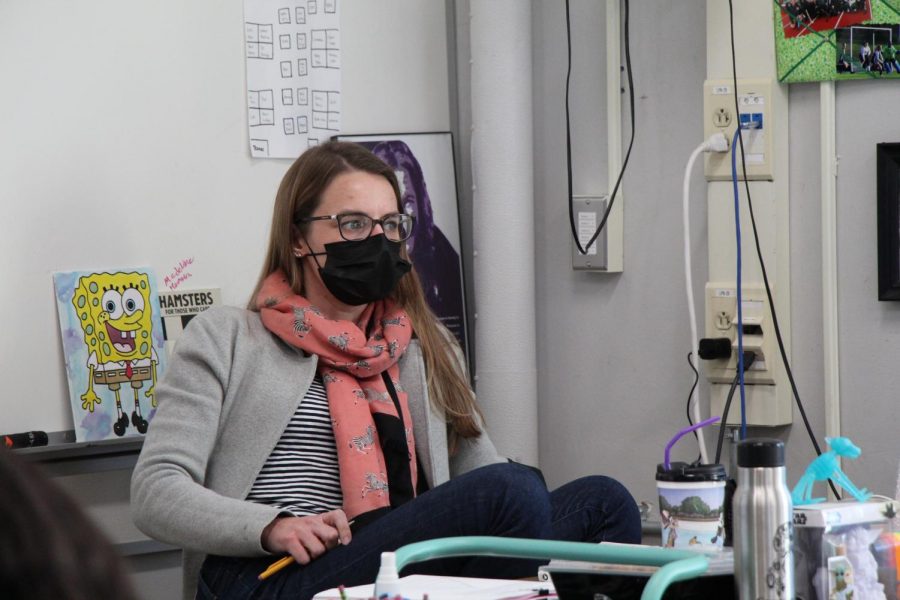Dyslexia Takes on the MI Senate
DYSLEXIA: A learning disorder and reading disability that results in challenges in identifying speech sounds and learning how they connect to letters and words (also known as decoding).
Many students with dyslexia face challenges at school. These include not being identified as having trouble, not being given the correct instruction and/or teachers not knowing about dyslexia or how to help them.
In an effort to find a solution, on Nov. 9, 2021, the Michigan Senate met to discuss four bills designed to support students with dyslexia. Senate Bill 380, requires student screening in grades K-3 for decoding difficulties and provides additional systems of support based on the results. Senate Bill 381, requires teacher preparation institutions to offer instruction on dyslexia and related evidence-based supports. Senate Bill 382, requires new teacher certifications to include instruction structured language and literacy as defined in SB380. Senate Bill 383, requires creation of an advisory committee to develop a dyslexia resource guide.
Susan Schmidt, a retired teacher, decided to take the lead on developing this legislation when she noticed that teachers weren’t trained in the science of reading. According to the substitute bill for 380, “Science of reading” refers to a cumulative body of evidence around reading development and issues related to reading and writing that come from research in many fields, including cognitive and developmental psychology, communication sciences, education and neuroscience.
In addition to spending many years as a special education teacher, Schmidt was also trained in 1998 at the Michigan Dyslexia Institute where she learned to use the Orton-Gillingham approach to teach reading. Schmidt also worked in the Michigan House of Representatives for five years where she learned how to shepherd legislation.
Schmidt consulted with numerous experts to form the four bills, including speech-language pathologists, literacy and dyslexia experts, Senators and parents of adolescents with dyslexia. She also took advice from former colleagues who had tried and failed to get legislation like this passed.
After many months of preparation, Schmidt and the group of experts testified in front of the Michigan Senate alongside Anri Haglund, a seventh grade student at Scarlett Middle School who was diagnosed with dyslexia.
“In third grade, the teachers wanted us to read out loud and I was afraid I would make mistakes or take too long,” Haglund said.
Haglund was in the same boat as many students with dyslexia — his teachers didn’t know how to help him and he wasn’t given the correct instruction.
“Now things are different,” Haglund said. “I’m working with a teacher that teaches me differently. I can read harder things and understand them. I should have learned these things sooner. School is easier now. I feel more comfortable about how I read and spell. These things should have been taught to all students when they are younger.”
Despite the testimony’s conclusion, there is still more to accomplish. The bill has to go through the process of being revised, going to the committee, having the Senate vote, having the House of Representatives vote and after this repeats a few more times, Governor Gretchen Whitmore can finally sign it.
Mary Margaret Hatch, a Community High School (CHS) junior, was diagnosed with dyslexia in third grade. Due to her diagnosis, Hatch is allowed more time on tests and assignments. She calls it time and a half, meaning that if a test was one hour, Hatch would be able to have one and a half hours.
“Most people don’t understand what [dyslexia] is, and so they don’t understand what actually helps and what doesn’t help,” Hatch said. “Even though I technically get accommodations, I have to ask for my accommodations constantly, and teachers don’t understand why I always need [them].”
CHS teacher, Emma Hamstra, was diagnosed with dyslexia when she was 17-years-old.
“Teaching kids how to [break habits involving dyslexia] when they’re five, six, seven or eight-years-old, is much easier than trying to teach somebody that’s 17-years-old,” Hamstra said. “[Especially when] they’ve been told they’re dumb their whole life because they can’t read. [If you] teach kids younger on, they don’t get stuck in a mindset that something’s wrong with them or that they’re dumb. So anything you can do earlier on, is going to make life easier.”
If these bills do eventually pass, Haglund, Hatch and Hamstra’s peers won’t have to go through what they had to go through just so they could receive the help they deserved.















